Unlock the Magic in Your Story Now
Get the Free 20 questions to Ask Before Launching Your Idea workbook when you sign up for occasional updates.
Get the Free 20 questions to Ask Before Launching Your Idea workbook when you sign up for occasional updates.
Articles filed in: Success
The Human Touch
filed in Meaningful Work, Success
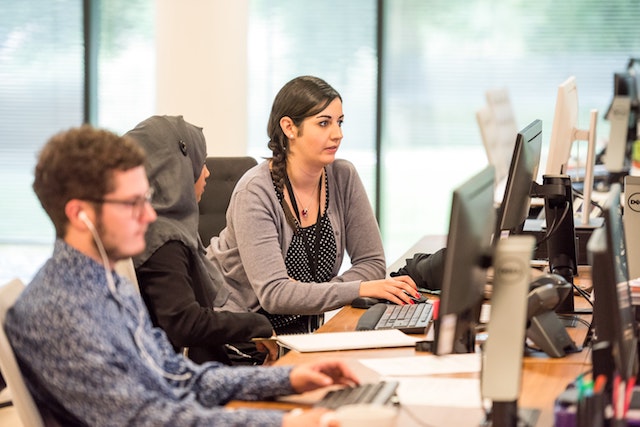 The woman on the other end of the line at the call centre hesitates. The change in her tone of tells me she doesn’t know the answer to my question. She hesitates. I hear the doubt in her voice. She’s having to go off script, and she’s terrified. She’s trained to answer only certain queries as quickly and efficiently as possible.
The woman on the other end of the line at the call centre hesitates. The change in her tone of tells me she doesn’t know the answer to my question. She hesitates. I hear the doubt in her voice. She’s having to go off script, and she’s terrified. She’s trained to answer only certain queries as quickly and efficiently as possible.
Her job is to funnel people to the right email address and move on to processing the next incoming call. She doesn’t know what to do next. And she hasn’t been encouraged to say: ‘I don’t know.’ or ‘I’m not sure, but I will find out for you.’
Our greatest fear when we are anxious or dissatisfied is that we will not be seen, or worse, that we will be ignored. What we want in those moments isn’t the right answer, right away. We want empathy—to be treated with humanity.
When our systems are designed to deliver and do the opposite communication breaks down. We fail everyone in situations where we prioritise efficiency over humanity. It isn’t just the people we serve who lose when we stop being human. When we are empowered to do work we’re proud of, everyone wins.
Image by Arlington Research
A Compass For The Heart
filed in Meaningful Work, Strategy, Success
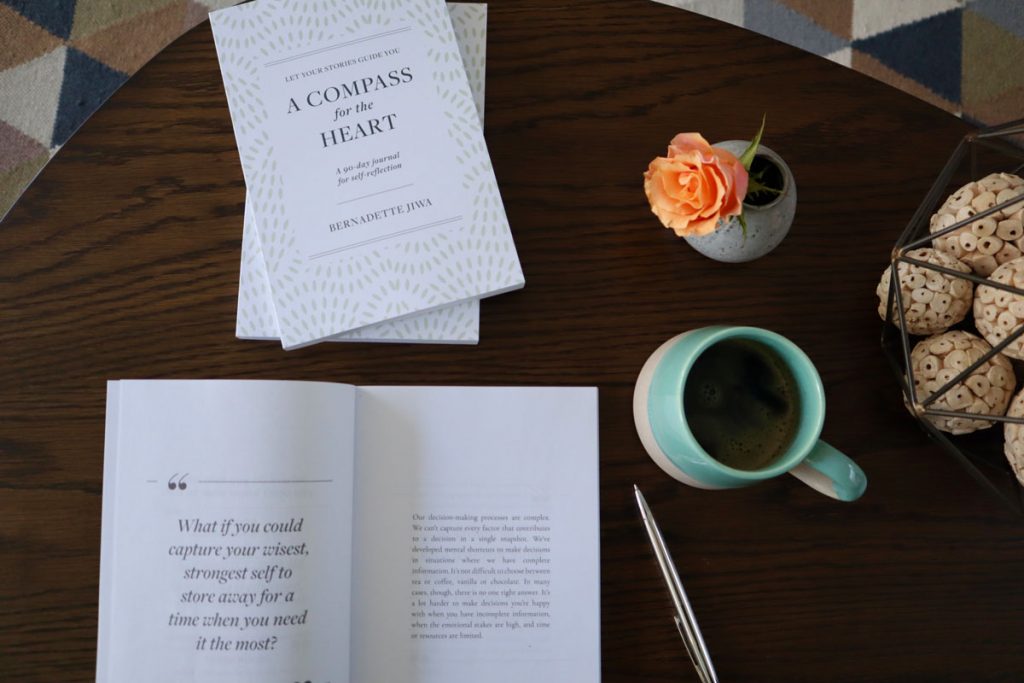
Where do you turn when you don’t know what to do?
Perhaps you do a Google search for facts. Maybe you read a book and get information. You might consult a professional for their expertise. And friends will gladly offer you opinions based on their experiences.
You can only gain insights and intuition based on your experience by taking time to reflect. Every day we have the opportunity to use yesterday’s stories as wise counsel for tomorrow. But we don’t have a way of remembering, recording or reflecting on what those everyday stories can teach us.
Inspired by my work with thousands of Story Skills Workshop students. I created
A Compass For The Heart. It’s a 90-day guided journal for self-reflection that helps you to record the everyday stories and life lessons to guide your decisions in good times and bad.
Inside, you’ll find a simple framework and templates for daily reflection that help you to capture your wisest, strongest self to store away for a time when you need it the most.
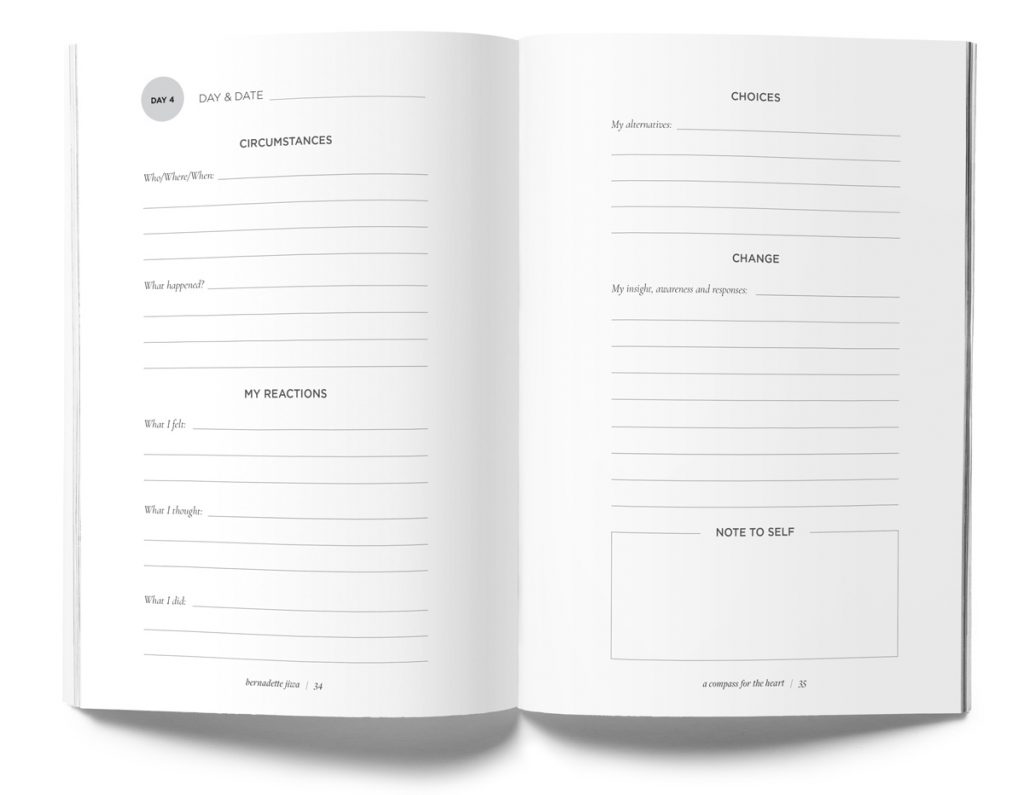
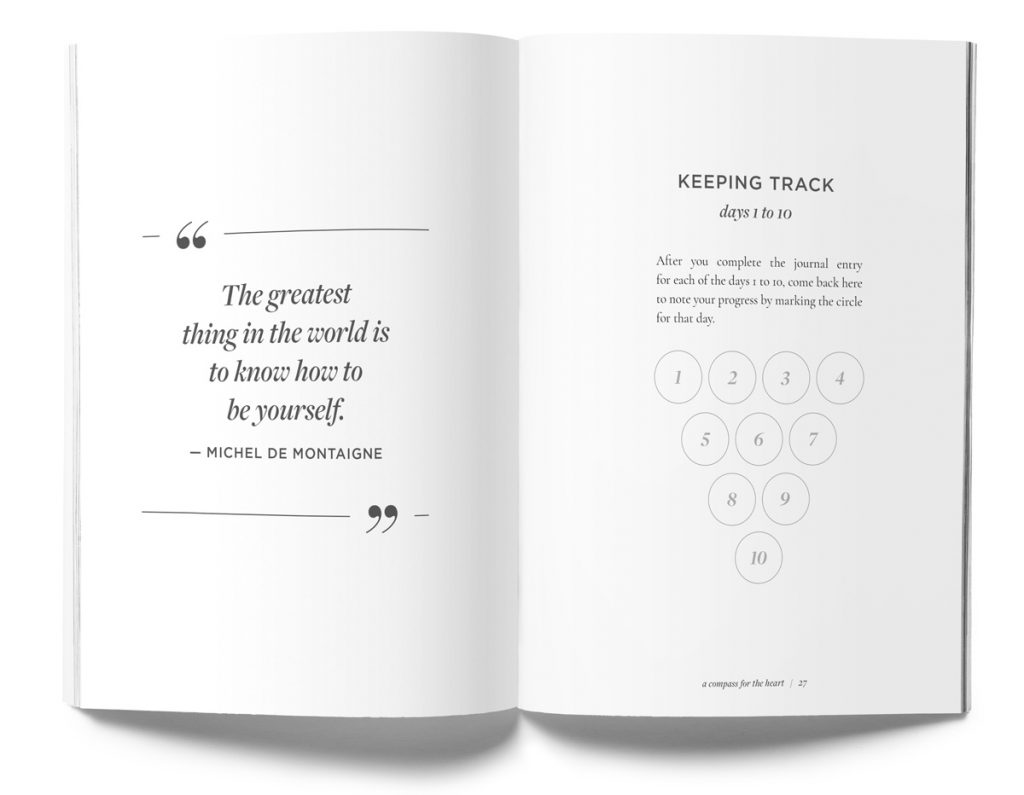
Although I’m a writer and I gather stories every day, I’ve never been one for journaling. There’s something about that blank page that’s intimidating. It feels like a sacred space for only the most elevated thoughts.
If like me, you’ve tried and failed to create a reflection ritual or journaling practice in the past, I hope you’ll give A Compass For The Heart a try. You can buy it now from Amazon.com, Amazon.co.uk, Amazon.ca or by searching your regional Amazon store. *Note: The journal will be available in Amazon’s Australian store in 6 weeks.
Thank you as always for giving me a reason to reflect, write and create. It’s a joy and a privilege to share ideas with you.
The Value Conundrum
filed in Marketing, Strategy, Success
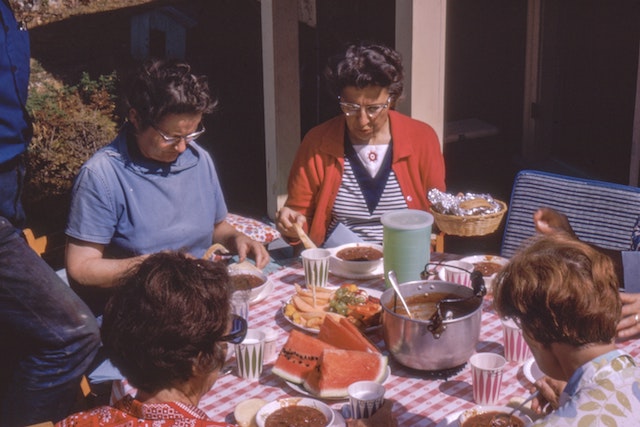
When I was growing up, my mother tried selling various products from home to earn extra money to support our family. I remember cookware and cosmetics being demonstrated to small groups of her friends over cups of tea and homemade sponge cake in the living room.
From day-to-day, Mum used the same old pans that had been handed down to her by my granny, and she hardly ever wore makeup. So her sales pitch usually came unstuck when she tried to demonstrate the products. She couldn’t show her friends how the products would make their lives easier or better.
Every purchase is a dance between risk and reassurance. The people we want to help must have faith in us before they can believe in the value we create or the stories we tell.
Image by Annie Spratt
Forward Thinking
filed in Meaningful Work, Strategy, Success

Every business owner or leader, entrepreneur or creative, walks the fine line between creating value in the present and thinking about what their contribution might be in the future. We need to do the work that’s in front of us today and plan for a tomorrow we cannot yet see. Often, we end up doing the work and walking this path alone.
Where do you turn when you need to reflect on your next right move?
Who do you use as your sounding board?
Do you know people who are on a similar journey who can help you?
When I asked those questions of my readers three years ago, the answer to all of them drew a blank. Many people said they had a professional presence on LinkedIn, but that didn’t serve their need for support when they needed it most.
That’s why I launched the Right Company—a paid, group-mentorship experience. It has become a tight-knit community of like-hearted, generous people from all over the world, doing work that matters—helping each other to get better together.
Today we’re opening up applications to the Right Company to a limited number of new members. If you’re looking for support to create momentum in your business or with your projects I hope you’ll apply today.
What kind of of future could you build with the help of the right company?
Image by Chris Montgomery
Up To Us
 Sometimes we choose to focus on those things that no amount of energy and enthusiasm can change. By doing so, we miss the opportunity to have more impact, both on our own lives and in the lives of others.
Sometimes we choose to focus on those things that no amount of energy and enthusiasm can change. By doing so, we miss the opportunity to have more impact, both on our own lives and in the lives of others.
All progress comes from discerning where our effort is best applied, then taking the small steps each day that will make the most difference.
Where should you apply your effort today?
Image by Bruno Mascimento
Leveraging Our Mistakes
filed in Meaningful Work, Strategy, Success

Each day we overlook some opportunity to see or to serve. We fail to challenge our assumptions and hold fast to our opinions. The result is that we sometimes miss the opportunity to do better.
This feels like bad news. But it doesn’t have to be.
What if instead of saying; ‘I could kick myself for missing that,’ we got into the habit of leveraging our mistakes instead?
‘What can I learn from this?’ is a powerful question.
Image by Caleb Jones
A Small Great Thing
 We’re usually excited about growing our audience or expanding our customer base.
We’re usually excited about growing our audience or expanding our customer base.
It’s hard to close the door on what might look like an opportunity to serve or scale.
But we do our best work when we know exactly who will get the most benefit from it and who it brings us joy to serve.
It’s easier to imply that our work is for everyone than it is to say this isn’t for you.
It takes courage to specialise and build a small great thing.
Image by Kenny Luo
Start To Finish
filed in Strategy, Success, Worldview

Conventional wisdom states that you can never have too much information when solving a problem or executing on a plan.
But we all know that information and data alone won’t get us to where we want to go.
All problem-solving and innovation require us also to imagine a future we can’t yet see. And perhaps harder, to have the courage to act despite what we don’t know.
Knowledge allows us to get our bearings, but it’s imagination and action that give us the forward motion we need to to start and finish.
Image by Gaelle Marcel
On Ambition
filed in Meaningful Work, Success, Worldview

Before I went to high school, everyone in our year sat an aptitude test. We were eleven years old, and the assessment took place over three hours one morning early in summer.
The goal was to identify each student’s potential and stream girls into year groups based on their IQ. The theory being that matching teaching to students’ abilities would deliver better educational outcomes.
It wasn’t only a pronouncement about our aptitude for learning that was consolidated in our minds, that summer. There was also a levelling of expectations about what was possible for each one of us—not just from our teachers, but in ourselves. Our ambitions were set at the age of eleven.
Career guidance conversations about going to university to study medicine and engineering rarely happened with girls who were not in the top stream. During the five years I was in high school, I saw only a handful of girls moved from one stream to another. Mostly down, hardly ever up.
In subjects like art and music, students’ potential was also identified early, so resources could be devoted to helping those most likely to succeed. We learned very early on to keep our ambition in check—to keep pace as much with our perceived limitations as our proven ability.
These lessons learned at a young age are hard to unlearn. The stories we tell ourselves can make us fearful of being ambitious for the future. Like some of our teachers, armed with the knowledge we have in front of us, we fail to see what might be possible.
Our mistake then, and still now, is our inability to be ambitious for each day. To match our effort with what we aspire to be and change now—not with some projection of our future-self or a future we cannot yet know. We shape the future we want to see in the present. One day at a time.
Image by Victoria Heath
Imperceptible Growth
filed in Meaningful Work, Success

When our kids were young my husband and I charted their growth on a door frame. Every few months they’d stand next to the wall, and we’d mark their height with a pencil.
Some months it looked like they hadn’t grown at all. Other times it seemed like they’d shot up overnight. The truth was they were growing every day—just not always in ways that were immediately visible.
It’s the same for all of the progress we make. Sometimes we can see and measure it, and other times we feel like we’re stuck in place. But just because the things we can see with the naked eye aren’t trending upwards doesn’t mean we aren’t growing.
Often it’s the growth we can’t see that is the making of us.
Image by Charlein Garcia